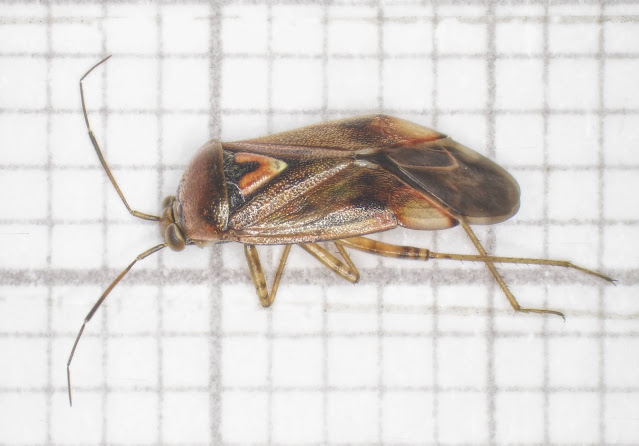The genus Lygus isn't getting any easier.
My very first record for 2023 is this Mirid bug sifted from Oak leaf litter. There are five species of Lygus on the UK checklist, L. maritimus, L. pratensis, L. punctatus, L. rugulipennis and L. wagneri. A typical Lygus ("smooth") pratensis ("of the meadows", so "Smooth Meadowbug") is easy to spot - shinier in overall appearance than the other members of the genus and with a single stripe on the scutellum (if present). Ah, there we have it - "if present". For Lygus is a notoriously variable genus, and quite frankly, often a pain to identify. This specimen appears to be an easy one, a nailed-on pratensis (but for the record, I did check the pubescence on the cuneus). But am I being over confident - is there more to Lygus than meets the eye? The degree of variability in this genus is worrying - does it signify hidden genetic diversity which conflicts with the current taxonomy? Are there a bunch of cryptospecies lurking in the leaf litter?
It's not just me that worries about this. A 2020 paper describes conflicts between DNA barcoding and species identification, although this partly arises from historic mis-identification of specimens rather than true taxonomic problems (Piemontese et al, 2020). In addition, a more recent paper (Namyatova et al, 2022) also suggests that DNA analysis does not agree with morphologically delimited Lygus species.
The cynical old bug-botherer (or cynical old bugger, if you prefer) in me is happy to blame the taxonomists for this mess. As a dyed in the wool lumper I'm happy to blame the splitters for these problems. But that doesn't solve the problem - identifying Lygus species reliably is not going to get any easier. It's an "interesting" way to start the new year. But things can only get better - can't they?
References:
Namyatova, A. A., Tyts, V. D., & Bolshakova, D. S. (2022) Identification and delimitation of the trans-Palearctic Lygus species (Insecta: Heteroptera: Miridae) using integrative approach. Insect Systematics & Evolution, 1(aop), 1-47. https://doi.org/10.1163/1876312X-bja10035
Abstract: Lygus (Insecta: Heteroptera: Miridae) is a Holarctic genus, and some of its representatives are important pests. Determining the Lygus species identity and their interrelationships is challenging. Our study aimed to delimit five trans-Palearctic species of this group: L. gemellatus, L. pratensis, L. punctatus, L. rugulipennis and L. wagneri. We implemented analyses of morphological characters, morphometrics, cytochrome c oxidase subunit I (COI) and 16S rRNA sequences. The results showed that those species could be delimited using morphology and most species pairs were different in morphometrics. Both COI and 16S rRNA were useful for species identification. Resulting phylogenetic trees contained two highly supported clades. One clade included species known from the Palearctic only, the other clade contained species with Nearctic and Holarctic distribution. Species were mostly poorly supported or non-monophyletic. Molecular species delineation approaches yielded results that generally did not correspond to the morphologically delimited species.
Piemontese, L., Giovannini, I., Guidetti, R., Pellegri, G., Dioli, P., Maistrello, L., & Cesari, M. (2020) The species identification problem in mirids (Hemiptera: Heteroptera) highlighted by DNA barcoding and species delimitation studies. The European Zoological Journal, 87(1), 310-324. https://doi.org/10.1080/24750263.2020.1773948
